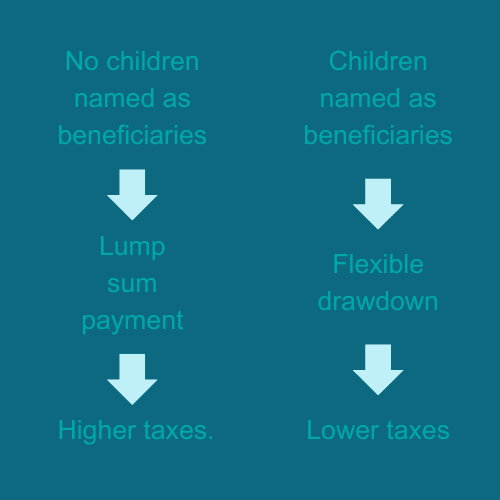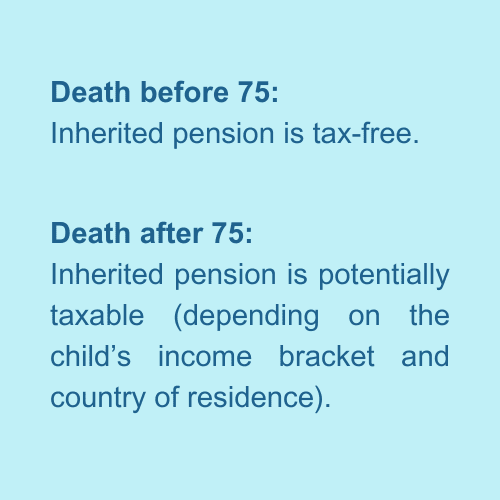
Protecting Your Family’s Future: The Case for Adding Your Children to Your Pension
Name children as pension beneficiaries
When it comes to planning your financial future, deciding who gets your pension is a big deal.
While naming your spouse as the sole beneficiary may seem like the obvious course of action, there are compelling reasons why you should also nominate your children.
In fact, a recent survey showed that over 60% of UK pension holders do not include their children as beneficiaries, which could expose them to significant tax issues down the road.

The Problem You Don’t See Coming
Let’s say you pass away, and your spouse wants to pass some or all of your pension to your adult children.
Here’s the issue: if you didn’t already name your children as beneficiaries, they’re stuck.
They can’t take advantage of flexible drawdown options.
Instead, they’ll get hit with a lump sum payment, which could lead to a tax mess.
For example, a £200,000 lump sum could result in up to £90,000 in taxes for higher-rate taxpayers.
Why?
Because only dependents or people you’ve specifically named as beneficiaries get the option to take that money out in a way that works best for them.

The Solution?
Simple. Name your spouse and your children as beneficiaries, even if it’s just a token 1%.
Case Study 1: Flexibility is King 👑
Meet John and Mary.
They’re in their early 60s and have always assumed John’s pension would go straight to Mary if he passed away first. No questions asked.
But their financial adviser steps in and suggests they also name their two adult children as beneficiaries. John and Mary are a bit sceptical but decide to go with it.
Then the unthinkable happens—John passes away unexpectedly.
Because the children were named as beneficiaries, they have the option to receive the pension benefits as a flexible drawdown instead of a lump sum.
According to HMRC data, beneficiaries using flexible drawdown typically save around 20–30% in taxes compared to those who take a lump sum.
Without that move, the children would’ve been stuck with a lump sum payment—less flexibility, more taxes, and definitely less financial security.

Case Study 2: Minimising the Tax Burden
Now let’s talk about Susan, a 68-year-old who thought leaving her pension to her husband was the simplest thing to do.
But during a financial review, her adviser lets her know that by also naming her children as beneficiaries, Susan can dramatically cut down on their future tax burden.
Here’s the upshot: if Susan dies before she turns 75, her children can inherit the pension tax-free.
Current UK pension rules state that beneficiaries pay no income tax on a pension inherited before the age of 75, but after 75, withdrawals are taxed at the recipient’s marginal rate, which can range from 20% to 45%.
However, even if she dies after 75, her children can still withdraw the funds gradually, which keeps them in a lower tax bracket.

If Susan didn’t take this advice, her children would potentially face a big tax bill if they were forced to take a lump sum.
By making this one simple change, Susan ensures her children get the most out of her pension without HMRC taking a great big slice.
Keep the Taxman at Bay
Here’s another curveball: if your kids get a lump sum, that money might end up in their estate, and you know what that means—inheritance tax. Inheritance tax (IHT) is currently charged at 40% on estates over £325,000.
But if they inherit the pension and keep the funds in the plan until they actually need it, it stays outside their estate, which means it avoids inheritance tax altogether.
Research shows that 5% of estates in the UK end up paying IHT due to unplanned pension distributions.
Plus, those funds can keep growing tax-free, which is a win-win for long-term financial security and growth.

Bottom Line
Naming your children as beneficiaries on your pension isn’t just about spreading the wealth—it’s about giving them options, cutting down on taxes, and making sure your legacy works for them, not against them.
In fact, naming children as beneficiaries can save families an average of 15% in taxes and inheritance tax.
It’s a simple move that protects your family’s financial future and gives you peace of mind knowing your wishes will be carried out exactly how you want.
FAQs
Can I name both my spouse and children as pension beneficiaries?
Yes, you can. Many people choose to name their spouse as the main beneficiary and their children as secondary or partial beneficiaries. Even allocating just 1% to your children can give them key benefits later.
Why should I include my children as beneficiaries if my spouse is already listed?
Including your children ensures they have access to flexible drawdown options, which can reduce their tax burden and provide more control over how and when they access the funds.
What happens if I don’t name my children as pension beneficiaries?
If your children are not named, they may only be eligible to receive a lump sum, which can trigger a large tax bill and limit how the funds are distributed.
Is it true that inherited pensions can be tax-free?
Yes, if the pension holder dies before age 75 and the beneficiary receives the money within two years, the funds are usually tax-free. After 75, the funds are taxed at the beneficiary’s marginal rate.
Will the inherited pension be subject to inheritance tax (IHT)?
No, as long as the pension remains within the pension wrapper and isn’t withdrawn as a lump sum, it typically sits outside the beneficiary’s estate for IHT purposes.
Can I change my pension beneficiaries at any time?
Yes. Most pension schemes allow you to update your nomination form at any time, and it’s recommended to review it after major life events like marriage, divorce, or the birth of a child.
What’s the benefit of allocating just 1% of my pension to my children?
Even a 1% allocation ensures your children are named beneficiaries, which gives them access to flexible drawdown options instead of being limited to lump sum payments.
Do adult children count as dependents for pension purposes?
Not usually. However, if they are named as beneficiaries, they can still receive inherited pensions under flexible rules—even if they are financially independent.
Can my children inherit my pension if I remarry?
If you remarry and don’t update your beneficiary form, your new spouse may receive the full benefit. It’s crucial to keep nominations up to date based on your current wishes.
Will my children pay tax on the growth of an inherited pension?
No. As long as the funds remain in the pension wrapper, they continue to grow tax-free. Tax is only applied when funds are withdrawn, depending on age-of-death rules and residency.

Talk to an Expert
Getting reliable expat financial advice shouldn’t feel complicated — or out of reach.
I’m Ross Naylor, a UK-qualified Chartered Financial Planner and Pension Transfer Specialist with nearly 30 years’ experience helping British expats manage complex cross-border investments, estate planning, and tax-efficient retirement strategies.
I firmly believe your location in the world should never be a barrier to expert, independent, and transparent financial advice you can trust.
If you’re planning to retire abroad, return to the UK after living overseas, or simply want to understand your cross-border options, I’ll help you cut through the noise and gain the clarity you deserve — with trusted expat financial advice tailored to your life.

